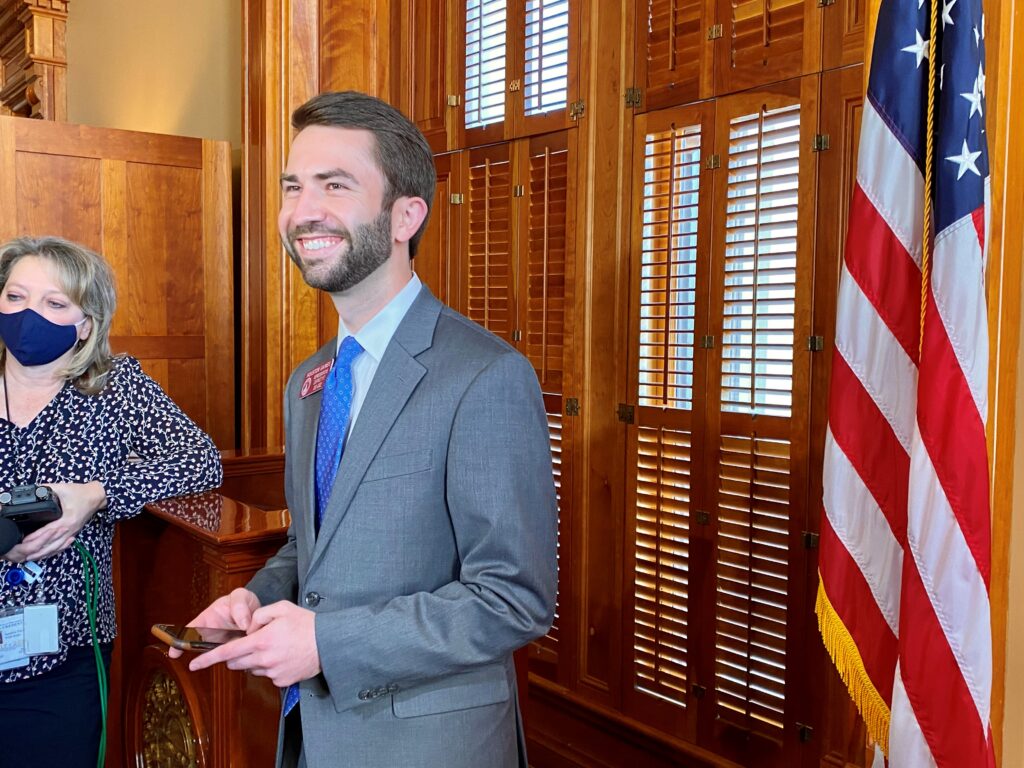
A bill aimed at preventing Georgia city and county governments from making deep cuts in the budgets of their local police agencies passed in the Georgia House of Representatives on Wednesday.
Sponsored by state Rep. Houston Gaines, R-Athens, the bill would limit local governments from reducing funds for police by more than 5% over a 10-year span. It includes exemptions for smaller jurisdictions and for spending on equipment purchases.
The bill passed 101-69 nearly along party lines, with three Democrats voting in favor. It now heads to the state Senate.
Speaking from the House floor on Wednesday, Gaines called policies to reduce funding for police a “radical idea” that would put police officers in danger and slow response times for emergencies.
“This legislation sends a strong message that we support our law enforcement officers and we will never defund police here in Georgia,” Gaines said. “When we have local governments that are out of control and putting lives at risk, we have to step in.”
Gaines also highlighted recent failed attempts by some Athens and Atlanta elected officials to slice millions of dollars from their police budgets amid protests over police brutality and racial injustice that swept across Georgia and the country last summer.
Critics called the funding restrictions a power grab by the state over local governments and argued it would stall efforts to fund other areas like mental health, housing and education that aim to keep people from landing in jail.
“The efforts to transfer funding from police departments is about addressing the root causes we are desperate to address,” said state Rep. Bee Nguyen, D-Atlanta. “This bill would shut down the necessary discourse leaders are having with their communities.”
Opposition to the bill also came from the Georgia Municipal Association and the Association County Commissioners of Georgia (ACCG), which represent city and county governments and argued police funding should be left to local officials.
Gaines’ bill comes after last summer’s protests following the high-profile killings of Black men by police officers, including the deaths of George Floyd in Minnesota and Rayshard Brooks in Atlanta.
Property destruction and violence at some of those protests sparked a backlash from conservative leaders over a push by some progressive officials to curb police funding, dubbed “defund the police.” The subject took center stage as an issue for both political parties in the 2020 election cycle.
Several Republican state lawmakers traced the need for the bill directly to those protests, saying police funding decisions have been politicized as a result.
“It is as much an answer to the politicization of an issue that has been made over the past few years,” said Rep. Alan Powell, R-Hartwell. “There’s one place you don’t need to defund and that’s public safety.”
Democratic lawmakers dismissed that way of framing the bill, arguing its intent instead is to let state officials pry into local affairs and ignore calls for more community-oriented policing in predominantly minority neighborhoods.
“This bill does absolutely nothing to increase or protect public safety,” said Rep. Renitta Shannon, D-Decatur. “There are better ways for the money to be spent and let us figure that out in our communities.”
Georgia Republicans have brought legislation in recent weeks to ease probation hardships for released offenders. Democratic lawmakers are pushing broad changes to arrest tactics like no-knock warrants, use-of-force training and civilian oversight of officer-involved shooting reviews.
A separate measure moving in the House to overhaul Georgia’s citizen’s arrest law has drawn bipartisan support, marking the major criminal-justice reform bill most likely to pass this year.
That bill would repeal state law allowing private citizens to detain someone who commits a crime in their presence or during an escape attempt. It would also let owners and employees in businesses detain those believed to have committed a crime on their property, so long as they’re handed over to local authorities within an hour.
Gaines’ bill also joins a handful of other measures critics have slammed as state overreach into local decisions, including a bill to block locals from banning certain energy sources that passed out of the House on Monday.